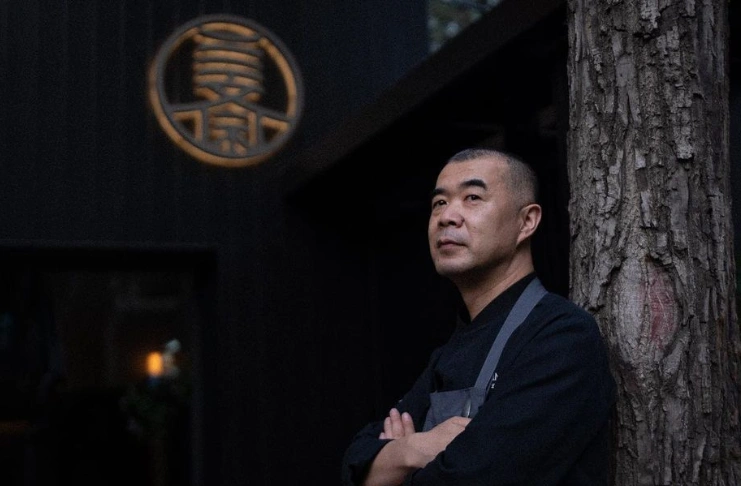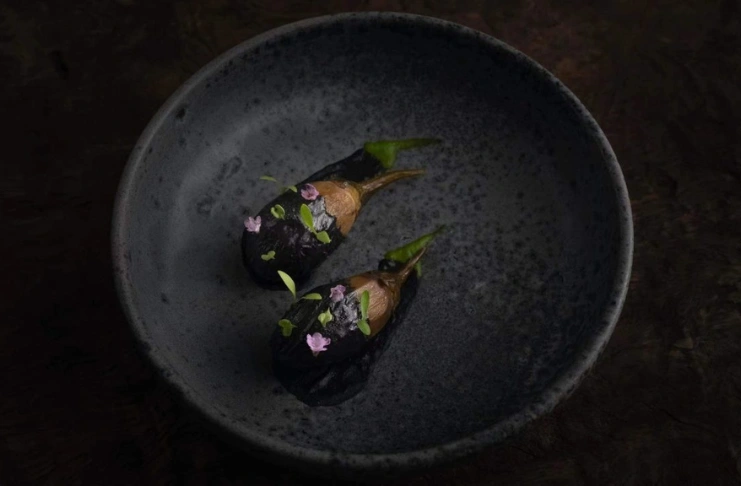In a city of 21 million and more restaurants than anyone can count, one name cut through the noise: Lamdre.
Named after a Tibetan Buddhist concept meaning “path and fruit,” Lamdre has done in one year what most restaurants fail to do in a lifetime, that too without ever cooking meat.
The moment you walk through its courtyard, Beijing fades away. The space is clean, spare, and intentional. Natural light pours through floor-to-ceiling windows, casting a glow on the carefully selected Japanese ceramics and abstract Chinese art.
But the real magic happens when you sit down to eat.
From Vision to Award-Winning Reality
For owner Zhao Jia, Lamdre was nothing short of destiny. “I’d always wanted to make a restaurant like this. Then, fate led me to this courtyard,” said the first-time restaurateur in the interview with The World’s 50 Best.
Opened in late 2022, Lamdre quickly captured the attention of Beijing’s discerning diners. In an astonishingly short period, it accumulated impressive accolades, including its first Michelin star and a coveted diamond rating in the Black Pearl Restaurant Guide.
Most significantly, Lamdre was recently bestowed the American Express One To Watch Award at the 2024 edition of Asia’s 50 Best Restaurants, catapulting it onto the global stage.
“Food is a language. It awakens memories,” Zhao explains. “It isn’t just something to fill you up.”
A vegetarian herself, Zhao envisioned Lamdre as a space “that prioritises health, sustainability, and a connection to the natural world.”
The Culinary Artist at the Helm

While Lamdre marks Zhao’s debut culinary venture, Head Chef Dai Jun brings over three decades of professional cooking expertise. Classically trained in Cantonese and Chaozhou cuisine, Chef Dai’s journey into vegetarian cooking began in 2011 at King’s Joy, Beijing’s introduction to contemporary vegetarian fine dining.
“I prefer cooking vegetarian cuisine,” he says. “It’s more challenging.”
Chef Dai describes his evolution as a vegetarian chef in three phases: “When I first switched from Cantonese cuisine to plant-based dishes, I didn’t know how to use vegetarian food to express what I wanted. I only knew how to follow my old way of making meat dishes. We would just remove the meat and use tofu instead!”
His second phase at Vege Wonder focused on refinement: “The second step in my journey was making the dishes more refined. The technique behind it was actually very complicated.”
At Lamdre, Chef Dai has reached what he considers his most mature phase: “Lamdre is my third step. I feel that I’m different than in the past. Here, I use very simple ingredients, a potato or some eggplant, to make ordinary and to-the-point dishes.”
This deceptive simplicity masks an extraordinary technique and a near-obsessive dedication to sourcing. Each ingredient, whether pine nuts from Taizhou, gingko from Tengchong, or buckwheat from Inner Mongolia, is selected with the reverential care usually reserved for precious gems.
Celebrating China’s Natural Bounty
“I am constantly fascinated by nature,” Chef Dai shared during the conversation with Salad Plate. “We live in a country with vast and diverse geographical environments and endless coastlines, rich in biodiversity. I am always discovering new flavours and textures, which inspire my creations. While cooking with only fruit and vegetables is much more challenging than preparing meat dishes, it has made me push the limits of my creativity.”
When not in the kitchen, Chef Dai spends time on research trips across China, discovering ingredients and traditions unique to each province. “We go to smaller places, like the countryside in Chaoshan or the morning market in Yunnan,” says Zhao. “There are always so many ingredients I’ve never seen before.”
These discoveries become revelations on the plate. One standout creation begins as sea sedge, corn, and rich morels arranged like a delicate fan of concentric, sunshine-yellow discs in the shape of a flower. Another presents a garden-like composition of Jerusalem artichoke mousse with edible moss crisps, sun-dried tomatoes, and glasswort flowers.
Simplicity as the Ultimate Sophistication

At Lamdre, every dish adheres to Chef Dai’s unwavering principle: “As much as my dish needs to taste good, the integrity of the ingredients must be preserved. At Lamdre, we respect the ingredients’ original flavours and beauty.”
The restaurant’s signature offering exemplifies this philosophy. Take handmade tofu created with soybeans from Heilongjiang, soaked for two hours in matsutake mushrooms and seaweed from Fujian, then served with house-made soy sauce, chili sauce, and fresh soy milk. What could be mistaken for simplicity is a testament to the heights that plant-based cuisine can reach when approached with reverence and mastery.
Dishes at Lamdre are a visual and gustatory masterpiece. Its seasonal tasting menu, for example, might include crystal-clear pumpkin soup with the squash’s natural sweetness, or paper-thin slices of bamboo shoots delicately draped over asparagus lettuce and water bamboo, punctuated by a green chili sauce.
The Meaning Behind the Name
The word ‘lamdre’ comes from a Tibetan Buddhist meditative system – literally ‘path’ and ‘fruit’, or that the result is within the journey. “The name captures our attitude at Lamdre,” Zhao explains. “If we focus on working hard, good results will naturally come.”
This philosophy permeates every aspect of the restaurant’s operation. “I think we’ve been able to turn it into what it is so quickly because Chef Dai and our team have truly run Lamdre from a place of love, rather than just treating it as a restaurant,” says Zhao.
Destiny Fulfilled, Future Unlimited
For Zhao and Chef Dai, international recognition isn’t the culmination of their journey but merely confirmation they’re on the right path. “I’m so touched,” says Zhao of being the first restaurant in Mainland China to win the prestigious American Express One To Watch Award. “I’m grateful that this can help share our philosophy and what we are doing at Lamdre with more people around the world. It makes us even more determined to keep exploring and improving.”
Chef Dai’s response to the accolade reveals both humility and ambition: “It’s an honour as a chef. We’ve only been open for a year, so receiving this level of recognition is such a wonderful surprise. This is an inspiration to keep reaching higher as we move forward.”
In a global dining sector often dominated by meat-centered cuisine, Lamdre stands as a powerful testimony to the creative possibilities of plant-based cooking when approached with dedication, skill, and profound respect for ingredients. Through Zhao’s visionary leadership and Chef Dai’s culinary artistry, this courtyard restaurant is changing how we eat and think about food itself.





